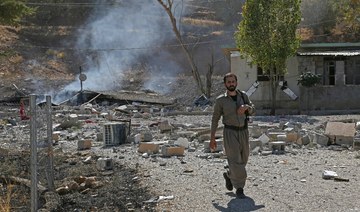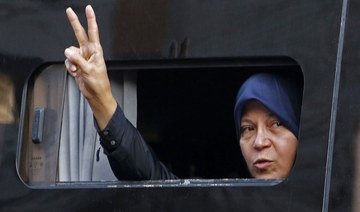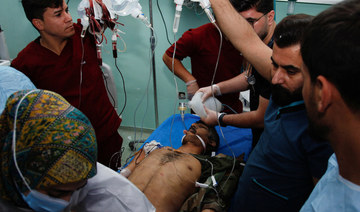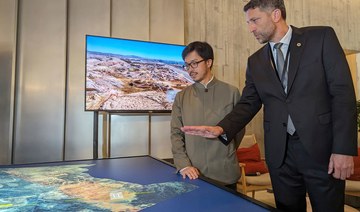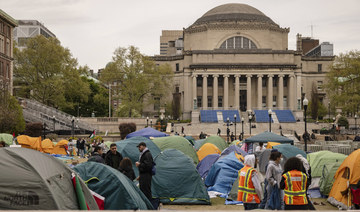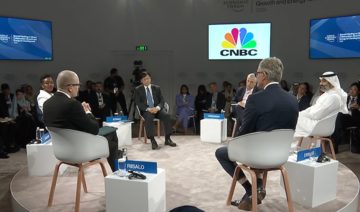KABUL: Taliban forces fired shots into the air on Thursday to disperse a women’s rally supporting protests in Iran over the death of a woman in the custody of morality police.
Deadly protests have erupted in neighboring Iran for the past two weeks, following the death of 22-year-old Mahsa Amini while detained by the Islamic republic’s morality police.
Chanting the same “Women, life, freedom” mantra used in Iran, about 25 Afghan women protested in front of Kabul’s Iranian embassy before being dispersed by Taliban forces firing in the air, an AFP correspondent reported.
Women protesters carried banners that read: “Iran has risen, now it’s our turn!” and “From Kabul to Iran, say no to dictatorship!“
Taliban forces swiftly snatched the banners and tore them in front of the protesters.
Defiant Afghan women’s rights activists have staged sporadic protests in Kabul and some other cities since the Taliban stormed back to power last August.
The protests, banned by the Taliban, contravene a slew of harsh restrictions imposed by the hard-line extremists on Afghan women.
The Taliban have forcefully dispersed women’s rallies in the past, warned journalists against covering them and detained activists helming organization efforts.
An organizer of Thursday’s protest, speaking anonymously, told AFP it was staged “to show our support and solidarity with the people of Iran and the women victims of the Taliban in Afghanistan.”
Since returning to power, the Taliban have banned secondary school education for girls and barred women from many government jobs.
Women have also been ordered to fully cover themselves in public, preferably with the all-encompassing burqa.
So far the Taliban have dismissed international calls to remove the curbs on women, especially the ban on secondary school education.
On Tuesday, a United Nations report denounced the “severe restrictions” and called for them to be reversed.
The international community has insisted that lifting controls on women’s rights is a key condition for recognizing the Taliban government, which no country has so far done.
Taliban fire into air to disperse women’s rally backing Iran protests
https://arab.news/93k6s
Taliban fire into air to disperse women’s rally backing Iran protests
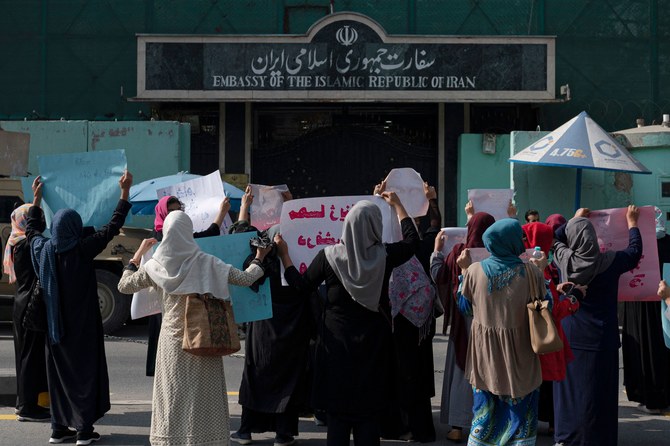
NEOM hosts global financial institutions, showcases progress and investment opportunities
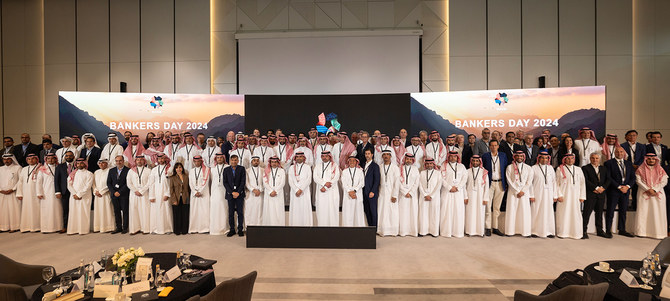
RIYADH: Saudi giga-project NEOM hosted 52 global, regional, and local financial institutions, showcasing ongoing progress across key projects and highlighting investment opportunities.
The meeting also reviewed the progress and latest developments in key NEOM undertakings, including THE LINE, Oxagon, Trojena, and Sindalah, scheduled to open later this year.
The event showcased the giga-project’s commitment to sustainable growth and development, underscoring its focus on environmental, social, and governance principles.
A notable aspect of the visit included a review of THE LINE, where dignitaries observed the rapid progress of phase one construction and gained deeper insights into the initiative’s design.
Nadhmi Al-Nasr, CEO of NEOM, said: “Since inception, we have been establishing strong partnerships to help drive this grand vision forward. NEOM’s vast scale and expertise offer strong and ongoing commercial opportunities for global organizations, including financial institutions.”
He added: “We were pleased to host guests from some of the world’s leading financial institutions in NEOM recently to discuss collaborative avenues. NEOM is open for business and we welcome all interested parties to be part of our continued success.”
The event drew representatives from 24 international banks and financial institutions, including those from Germany, Spain, and France, as well as the UK, the US, and China. Additionally, representatives from Japan and South Korea attended the event.
In addition, 13 regional banks from Qatar, Kuwait, and the UAE attended, alongside 15 financial institutions from Saudi Arabia.
In June 2023, NEOM launched the largest public-private partnership for accommodation, valued at over SR21 billion ($5.67 billion).
It also announced an SR37.5 billion joint venture with global logistics company Denmark’s DSV in October 2023 to provide logistics services for the giga-project.
These announcements, along with other NEOM partnerships, were well-received by attendees at Discover NEOM China, an event held in Beijing, Shanghai, and Hong Kong earlier this month. The event attracted more than 500 senior business and industry leaders.
Chants of ‘shame on you’ greet guests at White House correspondents’ dinner shadowed by war in Gaza
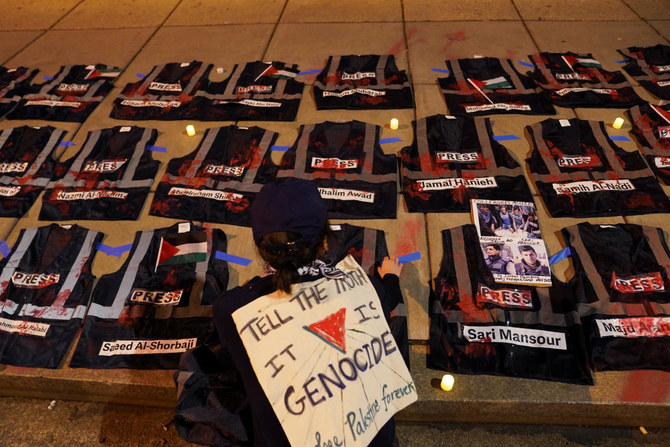
- “Western media we see you, and all the horrors that you hide,” crowds chanted at one point
WASHINGTON: The war in Gaza spurred large protests outside a glitzy roast with President Joe Biden, journalists, politicians and celebrities Saturday but went all but unmentioned by participants inside, with Biden instead using the annual White House correspondents’ dinner to make both jokes and grim warnings about Republican rival Donald Trump’s fight to reclaim the U.S. presidency.
An evening normally devoted to presidents, journalists and comedians taking outrageous pokes at political scandals and each other often seemed this year to illustrate the difficulty of putting aside the coming presidential election and the troubles in the Middle East and elsewhere.
Biden opened his roast with a direct but joking focus on Trump, calling him “sleepy Don,” in reference to a nickname Trump had given the president previously.
Despite being similar in age, Biden said, the two presidential hopefuls have little else in common. “My vice president actually endorses me,” Biden said. Former Trump Vice President Mike Pence has refused to endorse Trump’s reelection bid.
But the president quickly segued to a grim speech about what he believes is at stake this election, saying that another Trump administration would be even more harmful to America than his first term.
“We have to take this serious — eight years ago we could have written it off as ‘Trump talk’ but not after January 6,” Biden told the audience, referring to the supporters of Trump who stormed the Capitol after Biden defeated Trump in the 2020 election.
Trump did not attend Saturday's dinner and never attended the annual banquet as president. In 2011, he sat in the audience, and glowered through a roasting by then-President Barack Obama of Trump's reality-television celebrity status. Obama's sarcasm then was so scalding that many political watchers linked it to Trump's subsequent decision to run for president in 2016.
Biden’s speech, which lasted around 10 minutes, made no mention of the ongoing war or the growing humanitarian crisis in Gaza.
One of the few mentions came from Kelly O’Donnell, president of the correspondents’ association, who briefly noted some 100 journalists killed in Israel's 6-month-old war against Hamas in Gaza. In an evening dedicated in large part to journalism, O’Donnell cited journalists who have been detained across the world, including Americans Evan Gershkovich in Russia and Austin Tice, who is believed to be held in Syria. Families of both men were in attendance as they have been at previous dinners.
To get inside Saturday's dinner, some guests had to hurry through hundreds of protesters outraged over the mounting humanitarian disaster for Palestinian civilians in Gaza. They condemned Biden for his support of Israel's military campaign and Western news outlets for what they said was undercoverage and misrepresentation of the conflict.
“Shame on you!” protesters draped in the traditional Palestinian keffiyeh cloth shouted, running after men in tuxedos and suits and women in long dresses holding clutch purses as guests hurried inside for the dinner.
“Western media we see you, and all the horrors that you hide,” crowds chanted at one point.
Other protesters lay sprawled motionless on the pavement, next to mock-ups of flak vests with “press” insignia.
Ralliers cried “Free, free Palestine." They cheered when at one point someone inside the Washington Hilton — where the dinner has been held for decades — unfurled a Palestinian flag from a top-floor hotel window.
Criticism of the Biden administration's support for Israel's military offensive in Gaza has spread through American college campuses, with students pitching encampments and withstanding police sweeps in an effort to force their universities to divest from Israel. Counterprotests back Israel's offensive and complain of antisemitism.
Biden’s motorcade Saturday took an alternate route from the White House to the Washington Hilton than in previous years, largely avoiding the crowds of demonstrators.
Saturday's event drew nearly 3,000 people. Celebrities included Academy Award winner Da’Vine Joy Randolph, Scarlett Johansson, Jon Hamm and Chris Pine.
Both the president and comedian Colin Jost, who spoke after Biden, made jabs at the age of both the candidates for president. “I’m not saying both candidates are old. But you know Jimmy Carter is out there thinking, ‘maybe I can win this thing,’” Jost said. “He’s only 99.”
Law enforcement, including the Secret Service, instituted extra street closures and other measures to ensure what Secret Service spokesman Anthony Guglielmi said would be the “highest levels of safety and security for attendees.”
Protest organizers said they aimed to bring attention to the high numbers of Palestinian and other Arab journalists killed by Israel's military since the war began in October.
More than two dozen journalists in Gaza wrote a letter last week calling on their colleagues in Washington to boycott the dinner altogether.
“The toll exacted on us for merely fulfilling our journalistic duties is staggering," the letter stated. “We are subjected to detentions, interrogations, and torture by the Israeli military, all for the ‘crime’ of journalistic integrity.”
One organizer complained that the White House Correspondents' Association — which represents the hundreds of journalists who cover the president — largely has been silent since the first weeks of the war about the killings of Palestinian journalists. WHCA did not respond to a request for comment.
According to a preliminary investigation released Friday by the Committee to Protect Journalists, nearly 100 journalists have been killed covering the war in Gaza. Israel has defended its actions, saying it has been targeting militants.
“Since the Israel-Gaza war began, journalists have been paying the highest price — their lives — to defend our right to the truth. Each time a journalist dies or is injured, we lose a fragment of that truth,” CPJ Program Director Carlos Martínez de la Serna said in a statement.
Sandra Tamari, executive director of Adalah Justice Project, a U.S.-based Palestinian advocacy group that helped organize the letter from journalists in Gaza, said “it is shameful for the media to dine and laugh with President Biden while he enables the Israeli devastation and starvation of Palestinians in Gaza."
In addition, Adalah Justice Project started an email campaign targeting 12 media executives at various news outlets — including The Associated Press — expected to attend the dinner who previously signed onto a letter calling for the protection of journalists in Gaza.
“How can you still go when your colleagues in Gaza asked you not to?" a demonstrator asked guests heading in. "You are complicit.”
___ Associated Press writers Mike Balsamo, Aamer Madhani, Fatima Hussein and Tom Strong contributed to this report.
Saudi FM leads Gaza committee urging sanctions on Israel
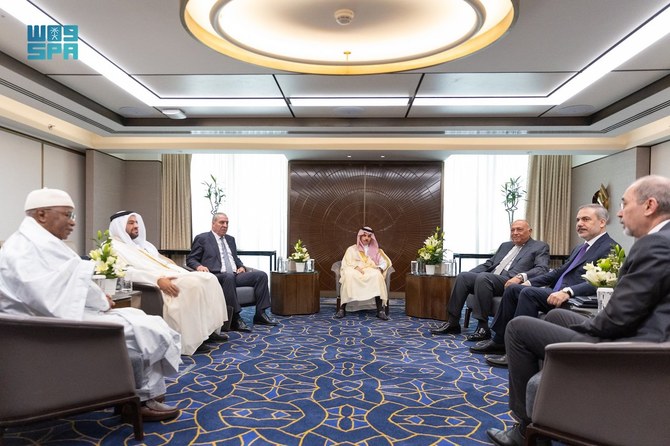
- Ministers also addressed the repression faced by peaceful demonstrators in Western nations who advocate for an end to the conflict in Gaza
The Gaza committee, chaired by Saudi Foreign Minister Prince Faisal bin Farhan in Riyadh, stressed on Sunday the urgent need for imposing sanctions on Israel.
The ministers advocated for halting arms exports in response to Israel's violations of international law and war crimes in Gaza and the occupied West Bank, Saudi Press Agency reported.
The ministerial committee, comprising dignitaries from Arab and Islamic nations, convened to address Gaza Strip developments and called for international legal mechanisms to hold Israeli officials accountable, alongside decisive action against settler terrorism.
It was strongly asserted during the meeting that the Gaza Strip constitutes an inseparable part of the occupied Palestinian territory, rejecting any attempts to displace the Palestinian population from their homeland or to carry out military operations within the city of Rafah.
Ministers also addressed the repression faced by peaceful demonstrators in Western nations who advocate for an end to the conflict in Gaza and condemn Israeli violations against Palestinians.
The meeting also focused on enhancing joint Arab and Islamic efforts to achieve an immediate cessation of hostilities in Gaza, with a priority on safeguarding civilian lives and ensuring the consistent delivery of humanitarian aid.
There was a commitment to persist in international endeavors aimed at recognizing an independent Palestinian state. This included the endorsement of a two-state solution, with East Jerusalem as its capital within the borders of June 4, 1967, in alignment with relevant international resolutions.
Homeland economies face growing challenges amid global turmoil, WEF special meeting in Riyadh told
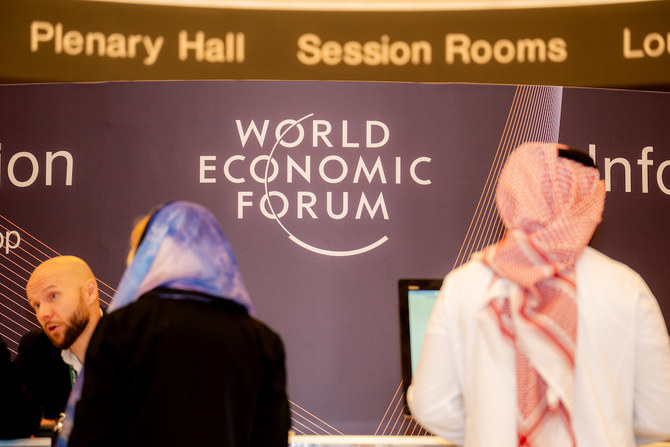
- Partnerships and alliances essential to restore equilibrium, protect security, experts and ministers tell panel discussion
RIYADH: Tensions in the Red are weighing heavily on Egypt, adding to the burdens caused by recent global crises such as the war in Ukraine and the pandemic, the country’s minister of planning and economic development told the World Economic Forum special meeting.
Speaking during a panel discussion on “What Homeland Economics Means for Trade,” Hala Elsaid Younes said that Egypt, like the rest of the world, has faced unprecedented crises in recent years, stemming from climate change problems, the global pandemic, the Russian-Ukraine war, and now the conflict in Gaza.
In order to combat these problems, Egypt has been focusing on controlling inflation, and investing in its labor force and infrastructure, she said.
“What is taking place in the Red Sea at the moment, where 50 percent of shipments are now rerouting, has caused a massive recedes in our profits. Regional and international tensions have also led to a rise in interest rates and soaring food prices.
“If this continues, governments will have little capacity to take care of their poor. We are working very hard on investing in our infrastructure by building more ports, and high railways to link the Mediterranean and Red Sea with inland destinations to expand our exports. We are lucky that over 70 percent of our population are less than 40 years old, so we are also investing in vocational training.”
Aloke Lohia, CEO of petrochemical firm Indorama Ventures, said that the company had to make “significant pivots” in recent years.
“We had a brilliant 20-year run where geopolitics were stable, interest rates were low, and the petrochemical business was growing. However, this all changed after COVID and current wars. Consumer demands and production are not matching anymore, and we are reducing 10 percent of our capacity.
“Homeland economies are great for countries which can leverage it, but not all countries are capable. Some countries, like my own Thailand, have to rely on tourism. So we are now looking at manufacturing our products in countries like India, where a large population resides alongside a stable government,” Lohia said.
US Congressman Brad Schneider said many countries are “looking for leadership.”
He added: “Complexities and uncertainties produce challenges for business; we need to engage in partnerships and alliances. I believe the world is safer when the US is engaged with the rest of the world. Creating equilibrium will be easier established when there are partnerships.”
Ahn Duk-geun, South Korean minister of trade, industry and energy, said that the world is “entering a dangerous phase of industrial competition, and we have to find a way to contain this race that so it won’t cause too much trouble for global trade.”
Clifford Kupchan, CEO of the consulting firm Eurasia Group, highlighted the risks posed by artificial intelligence.
“If AI gets into the wrong hands, the results will be worrisome. It will be very easy to create deepfakes and to create destructive weaponry. This will create an imbalance in world powers,” he said.
“When we talk about homeland economics, national security intervening with trade, I don’t think the prognosis is very good. This applies whether it is (Joe) Biden or (Donald) Trump who will head the presidency. We can be heading toward strategical degradation between the US and China.”
Saudi Arabia committed to green technologies, energy minister says
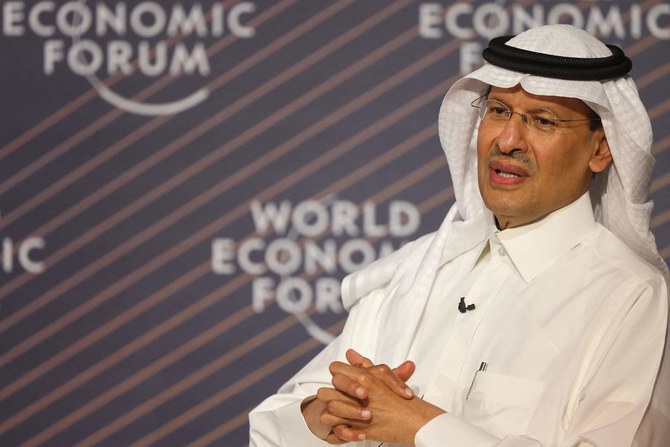
DUBAI: Saudi Arabia is focused on the production of green molecules, said Prince Abdelaziz bin Salman Al Saud, the Kingdom’s minister of energy.
“Our plans are clear to everyone, we are focusing on the molecule,” the prince said at a World Economic Forum meeting in Riyadh. “Being environmentally conscious is our human duty, whatever we do today should not endanger any aspirations of future generations.”
In a session focused on green molecules such as biofuels, hydrogen, and their derivatives, experts discussed various countries’ plans on how to move forward with the production of green molecules.
For his part, Prince Abdelaziz said he believed the concept should be color agnostic, because the molecule business has to do with how we produce clean energy, and that has no color.
“There is a carbon footprint that we need to manage and mitigate. I think stigmatizing things might narrow our choices rather than expand (them). We believe, as Saudis, that we require all the sources of energy, be it nuclear, hydrocarbon-based, or synthetic fuels. We are open to choices.”
The prince also said the kingdom is “libertarian” in its business approach, willing to share the expertise with other countries and that it is already in business with some European states.
“While the technology remains challenging, we continue to work on it to make it accessible and affordable to all,” he said.
The United Arab Emirate’s Minister of Energy and Infrastructure Suhail Al Mazrouei said that, as in Saudi Arabia, leaders in the UAE are aware of the need to invest in new energy.
“The region has become important in tackling problems and coming up with solutions,” Al Mazrouei said. “Clean energy is something we decided to venture into 17 years ago as we were thinking about what is going to happen when we export the last barrel of oil.”
Echoing the prince’s remarks, Al Mazrouei said consumers should not be limited to those considered ready simply because they can afford the price.
“We are working on the technology to make it accessible to all,” he said.
Amani Abou Zeid, commissioner for infrastructure and energy of the African Union, said that Africa has different levels of development and needs and expressed the need for alternative power options.
“Overall we are still electrified in only 49 percent of the continent, so more than half of the population doesn’t have electricity. Africa can’t afford to discard any solution at this point.”
Patrick Pouyanne, chairman and CEO of TotalEnergies SE, alongside Shrikant Vaidya, chairman of India’s Oil Corporation, and Erasmo Carlos Battistella, CEO of Be8, reiterated the importance of accessibility and affordability when producing green molecules.
Despite the positives from those countries engaged in the production of green molecules, such as job creation, there is still a long way to go.
Prince Abdelaziz said: “I think we should be conscious of the fact that the challenge is big, we are still talking about artificial intelligence, the component of the electrification, and what is required for it; the world will require clean molecules (and) it is our hope that we all work together to ensure this happens.”





